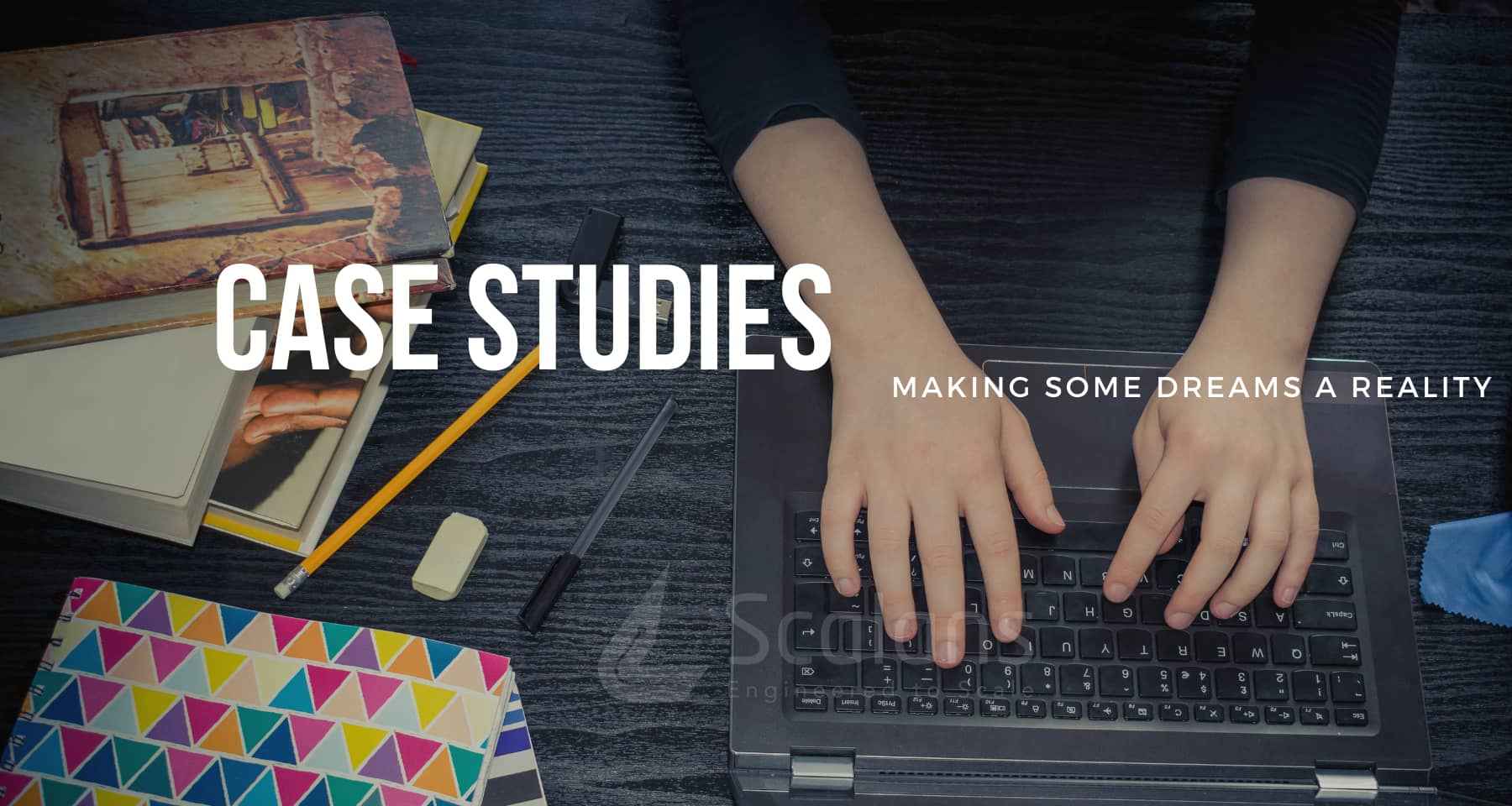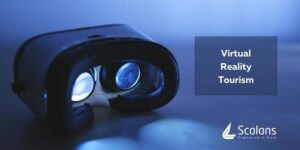
How Businesses Benefit From Travel App Development Using AR/VR
29th December, 2021
When the Covid situation was at its peak, the travel and tourism industry was at its all-time low., and when the situation eased a bit, people began to get out of their homes and then there was a new normal.
Interestingly, the change that has been happening before Covid is going to pick up with new vigor and energy.
But what was that change?
The use of Artificial Intelligence and Virtual Reality in the travel industry. This was a scenario that began to expand at a fast pace when the pandemic hit hard. With AI and VR, travelers can expand their travel plan beyond the conceptual realms, and virtually experience a destination before they actually visit it. It is certainly interesting how this will excite and thrill new travelers because this allows tourists to experience travel in a new way.
A good thing with the travel industry is that it is constantly experimenting in all aspects of travel – it could be anything ranging from hotel service to specific travel experiences or guided tours. Majority of the AR and VR travel apps in the industry offer exceptional tourist experiences, so when there is an element of something new, it elevates the VR and AR industries greatly.
Before going into detail about what AR can do for the travel industry let’s have a short explanation of what it is all about.
Augmented Reality In Travel Industry
Through Augmented Reality, a kind of digital technology, it is possible to make changes through technological brilliance so a person’s perception of change in physical surrounding. It is an augmented technology, similar to Virtual Reality, but it doesn’t replace the real-world environment at all, just overlay the digital components.

Augmented Reality has emerged to be an important ingredient in attracting tourists to visit destinations. Everyone connected with the travel industry can make use of this technology.
Hotels and tour managers can now entice tourists to visit new places and stay at their hotels through the technology of augmented reality. By including augmented reality in their applications, they can include local sights and attractions, show hotel rooms, and make the whole package attractive.
Customers have access to unlimited research and they will do their own study regarding destinations and stay. Access to Augmented Reality makes this possible.
Virtual Reality In Travel Industry
Just as the phrase sounds, virtual reality is a technology in which the viewer can view all angles of an object (i.e. see the product from all directions). In the travel industry that makes all the difference because it allows the tourists to see places in an immersive manner. By creating memorable and unique experiences for the viewer, it is possible for travel companies to stand out in the crowd, and provide exceptional travel experiences that make people want to travel. It could be just about the right thing for the tourism industry to smooth all the wrinkles caused by the pandemic.
Just as the phrase sounds, virtual reality is a technology in which the viewer can view all angles of an object (i.e. see the product from all directions). In the travel industry that makes all the difference because it allows the tourists to see places in an immersive manner. By creating memorable and unique experiences for the viewer, it is possible for travel companies to stand out in the crowd, and provide exceptional travel experiences that make people want to travel. It could be just about the right thing for the tourism industry to smooth all the wrinkles caused by the pandemic.
Virtual Reality is taking the tourism industry by storm. People are getting a new kind of experience through this innovative technology now. This is a far cry from what the travel businesses used to describe to their customers, now they can actually get the live stories, the real feel of visiting places and staying at hotels as opposed to merely reading about them. How long a way we have come from text, photos and videos to a wonderful immersive experience of the environment.
VR is really allowing businesses to get connected to their customers and customers get more loyal, by being connected to a brand that gives them immersive experiences. According to several studies, the majority of travelers prefer to have a VR experience of the places and destinations they plan to visit, and online travel shoppers who are able to see their rooms online would definitely book it.
How travel companies and tour operators can sell their destinations using VR?
VR is the most obvious way to sell destinations, resorts, hotels and activities. Getting an all-inclusive immersive experience would definitely allow them to stir up interest, unravel hidden gems and get customers to actually buy from them.
- How hotels sell their rooms and services through VR
Here is an example of a hotel trying to get customers to book their premium rooms with a seaside view. They can reveal the premium facilities in the rooms, and the beautiful sights and views through VR, and show them the facilities of the standard rooms. Through VR technology, people can actually ‘feel’ the difference between these two rooms, and be motivated to book the premium ones. The biggest competition among the hotels and resorts would be the services they provide – the rooms, the lobby, the restrooms, the pools and other facilities offered to guests. And of course, the price at which these are offered.
- Wildlife tours and safaris made thrilling even before the actual visit
Here is another example of a travel company (fictitious, of course). This is a company that’s sending travelers to visit places in Africa. How about having a VR Android app for tracking lions and gorillas. It is possible to create a scenario where the tourist can actually meet his guide before going on to the tracking safari. There are tour companies that already indulge in similar activities, and this has already piqued the interest of tourists who booked tickets to Africa. And of course, this doesn’t apply to Africa alone. It could be to India, Philippines, Malaysia, Singapore, or any other places offering such tracking facilities.
- Airlines making the best of AR and VR
Airlines target people in the premium segment by providing the most advanced technologies for entertainment. Apart from providing a comfortable and discreet travel opportunity, customers get the whole package about the destination they are visiting, including local attractions, hotels, interesting places to see, history and so on. The in-flight apps provided to customers would provide insights of future destinations, prompting people to visit them.
- VR can recreate the past
An enticing feature that VR can provide to people visiting historical places would be recreating the past by showing them the glory and splendor of ancient places and how they have changed with time. Providing a new generation time travel experience of sorts has really taken up with the travel industry with travel companies adding a VR experience while planning travel packages to historical places. There are different ways to enact the historical reconstruction of bygone eras, with VR shows of an ancient time period showing the life and events of the time, or representation of important events of the past, for example, launching of Apollo II or perhaps, an enactment of the Battle of Plassey.
- Planning VR and AR travel applications
There are so many ways in which VR and AR can be integrated in travel applications. One simple way to do that would be to include Location-based AR in it.
To create location-based AR feature, the technology relies nondigital compass, accelerometer and GPS to locate a person with high levels of accuracy. Through beacon technology and push notifications, businesses can send information to customers when they enter a particular location.
- Selling emotions through the technologies
The travel industry hinges on the emotions that it sells by enticing people through these technologies. By showing the hotel rooms, recreating the past and other interesting aspects that travel businesses come up with, they are able to touch the emotional nerve of the customers, making them want to come and actually experience them. The customer is not just actually seeing what they are presenting, they are allowing the customers to interact with the environment and make them actually experience virtually the destination and its attractions.
Conclusion
While AR is a fairly new concept in the travel industry, VR has been around for some time, and both are now touching areas such as transportation, travel, overseas visits, local transit, local attractions, accommodation and so on.
Despite the pandemic wreaking havoc in all aspects of life and every industry, AR and VR together makes the future of the travel industry bright. Their immense potential is to be tapped correctly, so if you are looking to connect with your customers in an innovative manner, there are several ways to do it: Immersive Navigation, Augmented Tourist Destinations, Interactive Hotel Elements, AR City tours, Bacon Technology and Push Notifications, Augmented Reality Gamification and many more.
Talk to Our Team for Expert Opinion.
Scalan Labs is a full-service product engineering company that provides dedicated teams for full stack development. We have the top1% talent for product engineering and dedicated teams to help you reach your business goals. Contact us today to learn more about how we can help you!



